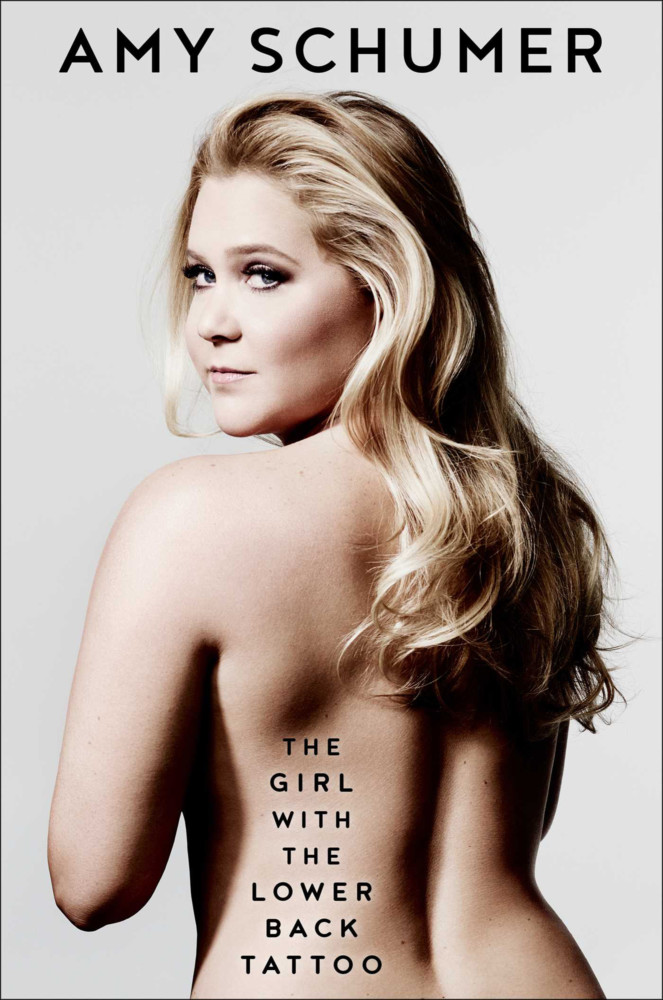By Heidi Stevens
Chicago Tribune
WWR Article Summary (tl;dr) This is a solidly positive review of Amy Schumer’s new book “The Girl With the Lower Back Tattoo.” In it, the comedian shares anecdotes, confessions and observations collected during her childhood, teenage years and her time in the entertainment industry.
Chicago
I often wonder what makes people want to bare their souls to a fickle, hostile public.
It’s not an unfamiliar inclination, I frequently delve into personal details in my own writing. But I’m not sure I can succinctly explain why. As a way of bearing witness to my own life? In the hopes that someone will recognize herself/himself in my experiences? Masochism?
In “The Girl With the Lower Back Tattoo,” Amy Schumer is the latest celebrity to take the skeleton of what we know about her and flesh it out with anecdotes and confessions and observations collected along her path. She’s 35, so she is (hopefully) only about a third of the way along her path, but what she offers here is a better, more deeply felt life-so-far book than most I’ve read.
After some initial throat-clearing in the first 30 pages (the book’s weakest), Schumer weaves a brave, vulnerable tale without falling into the usual celebrity traps of neediness and defense.
She writes about her dad’s multiple sclerosis, a sexual assault she endured as a teenager, her experience living with an abusive boyfriend, her parents’ multiple failed marriages and her own reckoning with an entertainment industry that prizes appearance over substance.
In so doing, she subtly offers a rationale for all this self-revealing: It strengthens you.
“I’ve been criticized from so many angles and laughed at for all the wrong reasons,” Schumer writes. “But, as many comics have realized, there is a gift in being laughed at, or heckled, or even booed off the stage. When your fears come true, you realize they weren’t as bad as you thought. As it turns out, the fear is more painful than the insult.”
In the chapter titled “Beautiful and Strong,” Schumer relives a couple of soul-crushing dates (maybe too generous a word) at pivotal moments in her life. The self-doubt and humiliation are eminently relatable, even if you’ve never been set up with a guy wearing a shark-tooth necklace and hair plugs who reminds you you’re “no model.”
“Sometimes I want to quit, not performing, but being a woman altogether,” she writes. “I want to throw my hands in the air after reading a mean Twitter comment and say, ‘All right, you got me. You figured me out. I’m not pretty. I’m not thin. I don’t deserve love. I have no right to use my voice. I will start wearing a burka and move to a small town upstate and wait tables at a pancake house.'”
But of course she doesn’t.
“I know my worth,” she writes. “I embrace my power. I say if I’m beautiful. I say if I’m strong. You will not determine my story. I will. I’ll speak and share and (expletive) and love, and I will never apologize for it. I am amazing for you, not because of you. I am not who I sleep with. I am not my weight. I am not my mother. I am myself. And I am all of you.”
She’s also hilarious, which manages to come through on the page. (No small feat.)
Her teenage journal excerpts, which she footnotes with 2016 thoughts, contain some of the wittiest writing I’ve experienced.
The chapter titled “Athletes and Musicians” has very little from which I can quote here, but trust me when I say: It’s spit-out-your-Starbucks-in-public funny.
“An Exciting Time for Women in Hollywood” is a scathing send-up of both Hollywood and the reporters who cover it, based mostly on her experience hawking “Trainwreck” to a suspicious press corps. (The list of titles for “Trainwreck” in various foreign markets, by the way? Fantastic. “A Disaster Girl.” “Derailment.” “A Girl Without Complexes.”)
“First, I’d like to thank all the people who pointed out that I was a woman,” Schumer writes. “Your compliments were phrased very precisely so that I was never just described as ‘funny,’ but rather, a ‘funny woman.” You made sure I didn’t lose sight of my ovaries. Thank you. Without your constant reminders, I may have just forgotten my uterus on a crosstown bus.”
Schumer dedicates a chapter to Mayci Breaux and Jillian Johnson, the two women killed in July 2015 when a man opened fire in a Lafayette, La., theater showing “Trainwreck.” She launches into an impassioned plea for sensible gun control, a cause she adopted after Breaux’s and Johnson’s deaths, and for which she offers no apologies.
“I know that for many of you, this might not be a chapter you signed up for and you may be thinking, Get back to telling your vagina jokes! Make us laugh, clown! I hear you. When I’ve written sketches about gun safety on my TV show, people have responded by saying they wish I’d just be funny. … I’ll tell you what I tell them: No! I love making people laugh and am grateful that I’m equipped to do that. But when an injustice affects me deeply, I will speak about it, and I suggest you do the same.”
In many ways, “The Girl With the Lower Back Tattoo” is 314 pages of Schumer finding her voice and using it to speak about injustices that affect her deeply, some more grave than others.
It’s an exercise in either vanity or courage when a celebrity offers a self-reveal. In this case, it’s mostly the latter.
And even the parts that veer into the former are witty enough to make you glad you stuck around.














































































































































































































































































































































































